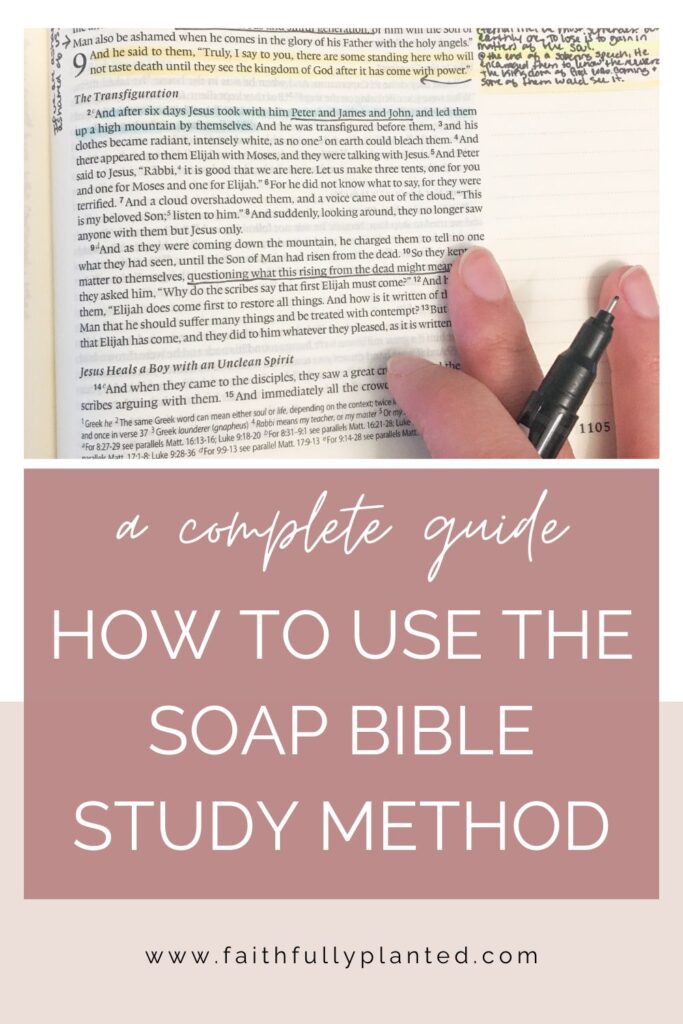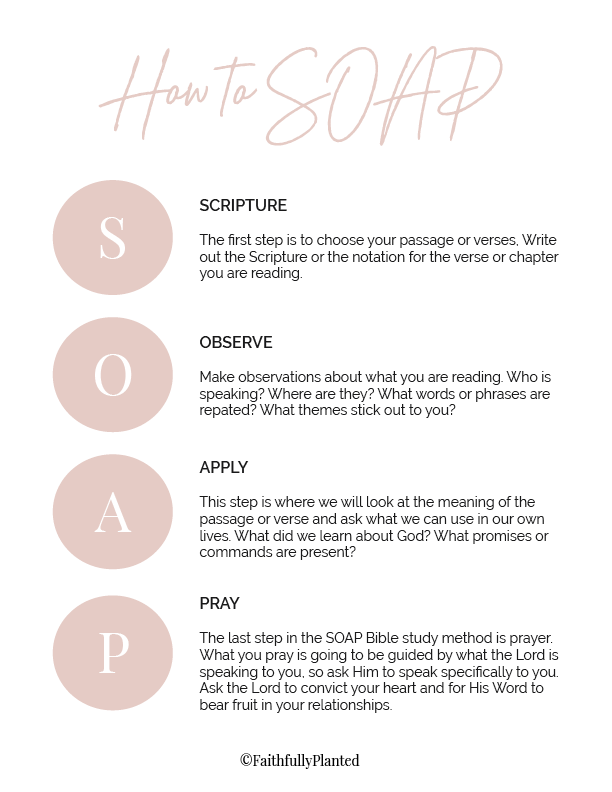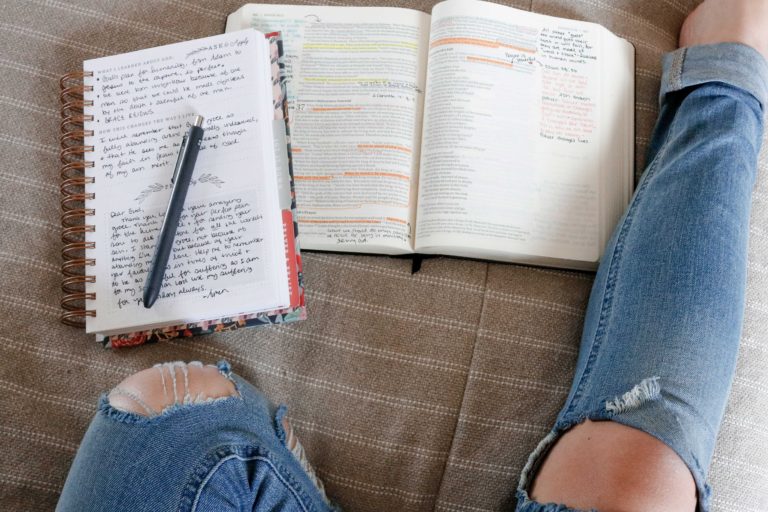The SOAP Bible Study Method: A Step By Step Guide

What is the SOAP Bible study method?
The SOAP Bible study method is a way to dig into Scripture for yourself using an easy-to-remember structure. There are many ways to study the Bible, and the SOAP method is one of the most popular.
It is a way to organize your thoughts during your Bible study time. This method is simple and easy to use, making it a great starting point if you are new to studying the Bible.
It can be easy to overcomplicate Bible study or get overwhelmed with the wealth of information within the pages of the Bible. The SOAP Bible study method takes the complication out of what to do or how to start.
Simply follow the steps, and let God speak to you through His Word.
What does the SOAP acronym stand for?
An acronym is a word that is used to stand for something else, with each letter representing a word or phrase in a system or SOAP stands for
- Scripture
- Observation
- Application
- Prayer
These are the basic four steps of using the SOAP bible study method. This acronym makes it easy to remember and use the steps in your daily Bible study.

Who should use the SOAP Bible study method?
Anyone can use this method to help them study the Bible, but it is especially helpful for beginners and those who are short on time. Students, mothers of littles or busy teenagers, the busy teens themselves, military spouses, nurses who work long shifts, etc.
This method may be too simplistic for Pastors, Ministry leaders, or Bible scholars.
How do you use the SOAP Bible study method?
Using this method is relatively simple and can be done with minimal supplies. However, you can also utilize a template or journal if you like a premade structured workspace.
All you need is a notebook, a pen, a Bible, and/or a good study Bible.
Scripture
The SOAP Bible study method works with any verse or passage of Scripture. You can write out the verses you are studying or just write down the notation for the passage such as “Romans 1” or “Ephesians 4:1-4.”
That is mostly a matter of personal preference and how much space you are working with, though there are many benefits to physically writing out Scripture. Some passages may be too long or you may be short on time, so writing the notation would work well in those situations.
Observe
In this step, you will make observations about what you are reading. We are not making any personal application in this step or asking what the passage means. We are simply making note of what is in the verse.
It may help you to have a template or a double-spaced and printed (or digital with a stylus) version of the passage to make notes on. This is also where a journaling Bible would come in handy, so you can take notes right in the pages of your Bible.
If you prefer a notebook-style Bible, the ESV Journaling Spiralbound set would be perfect for you!
Here you will note:
- Who is in the passage? Who is speaking or narrating? How are they described?
- Where are they? What is their location? Are they traveling?
- What are they doing?
- When? Make a note of the timeframe.
- Why? Is there a reason these events are happening? A reason why the person is speaking on that topic?
In addition to these questions, make note of:
- Repeated words or phrases
- Themes
- Verb tense
- When God speaks audibly
- Cross-references
- Transition words (ex. therefore, then, because, if, etc.)
- Lists
- Comparisons
- Commands
- Words you don’t know
- Questions that come up
All of this information about the passage will give you context to decide the meaning and application of the passage.
Apply
This step is where we will look at the meaning of the passage or verse and ask what we can take away from what we learned. Here are some study questions to help you apply what you are learning to your life:
- Is there a situation God is using this passage to speak into?
- What does this passage teach me about God and His character?
- How do I see Jesus in this passage (even the Old Testament?)
- Are there promises or commands for me in this passage?
- What actions or attitudes do I need to take into my own life?
- What is God convicting me of in this passage?
- How does my life need to change in light of this passage?
- What have I learned about my relationships? How do I need to change to be a better (wife, friend, mother, daughter, etc.?)
- Are there Scriptures here I need to memorize?
Pray
The last step in the SOAP Bible study method is prayer.
What you pray is going to be guided by what the Lord is speaking to you, but here are some tips for what you can pray to make the most of your Bible study time!
Pray that:
- God would reveal meaning to you as you meditate on His Word
- He would convict you of any areas you need to change or prune
- He would use His Word to change your heart and align it with His desires
- Your time in the Word would bear fruit in your relationships
The entire purpose of studying the Word is to learn about God and grow closer to Him. Your time of prayer is when you get to speak to Him and let Him speak to you.
I pray these steps to using the SOAP Bible study method encourage you to get into God’s Word and learn more about who He is and how much He loves you.
Your Sister In Christ,









Good Morning,
First of all thank you for taking the time to m.ake this blog. I have been a Christian for many years but honestly have never really studied the Bible because I just did not know how. Today I came across your SOAP method. When I clicked to download the cheat sheet I got a message that I did not have access to the page. Do you have another link that I can go to?
Thank you in advance and I pray that you and your family have a blessed day.
Wendy
Hi Wendy! Thank you for your kind words. U was able to resolve the issue and you should be able to download now!
Be sure to check out the other posts in the Bible Study Methods series!